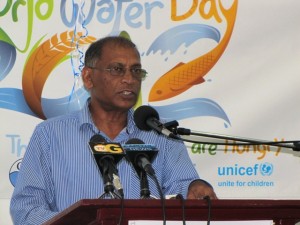– Dr Ramsammy tells Washington conference
By Samuel Sukhnandan in WasShington
International HIV/AIDS advocate and former Health Minister Dr Leslie Ramsammy told delegates of the 19th International AIDS conference being held in Washington DC that Guyana is pursuing a trajectory of eliminating HIV/AIDS by 2020, as outlined in its strategic plan. Minister Ramsammy said Guyana has also firmly denounced efforts by some persons to criminalise HIV transmission, while creating a level playing field. Dr Ramsammy was at the time addressing a regional workshop that focused on the work being done and successes made in fighting HIV and AIDS in the Caribbean region.





Comments are closed.